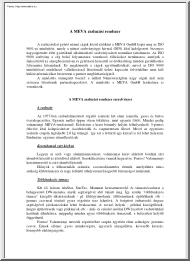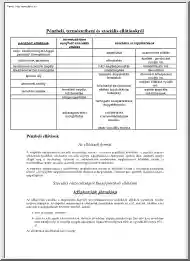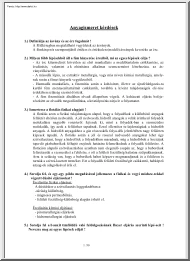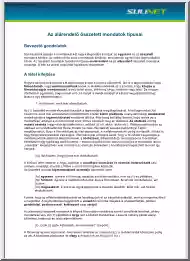A doksi online olvasásához kérlek jelentkezz be!

A doksi online olvasásához kérlek jelentkezz be!
Nincs még értékelés. Legyél Te az első!
Tartalmi kivonat
Animal Farm – “some animals are more equal than others” a novel by George Orwell The Animal Farm is an allegorical novella, which was published in England, in 1945. The story reflects the events leading up to and during the Stalin era before World War II. However Orwell himself was a democratic socialist, and also a member of the Labour Party, he criticized Stalin and the Stalinism. The book has won many awards since its first publication It contains timeless message about the Stalinist dictatorship, and the corruption of the revolution by its leaders. In his other novel, the 1984 he wrote about all totalitarian systems, and the impossibility of a true Utopia, but in Animal Farm he picks a real example, the Soviet Union. The book consists of 10 chapters and 112 pp. Its original title was Animal Farm – A fairy story, but it was dropped later. Some interesting fact about the book: Napoleon is called in the French edition César (Caesar). The main characters of the book: Nearly
every character in Animal Farm satirise someone, or something in Communism. Communism itself is called “Animalism”. The pigs (the dominant animals in the farm): Old Major: He is the prize winning old boar, who describes the basics of animalism to every animal in the farm in the first chapter. His role can be associated with Karl Marx, the founder of the Marxism, and Lenin, the leader of the October Revolution and later the Soviet state. The Old Major gave the inspiration to the rebellion in the book, and the animals put his skull to public display, like it was done with Lenin’s corpse. Napoleon: He is the main tyrant and villain of Animal Farm. His role is based upon Joseph Stalin. He is a Berkshire boar He took away the dogs’ puppies, and raises them to his own secret police (KGB). He builds up his power under the shadow of Snowball, and when he becomes enough powerful, he drives Snowball off the farm. For the end of the novel, he starts to behave like humans, walks on his two
legs, and wearing clothes. Snowball: The only rival of Napoleon. He could be an allusion to Leon Trotsky, who was exiled from the Soviet Union, and later murdered. He gains the animals’ trust in the first year and with his lead they have a very successful harvest. He works for the egalitarian utopia, which was dreamed by the Old Major, but Napoleon and his dogs chase him out of the farm. After this, the propaganda makes him the only evil and responsible for every bad thing that happens to the farm. Squealer: a small and coward pig, the right hand of Napoleon. He is the minister of propaganda. He manipulates the language to find excuses to all of their leader’s actions, and to justify every cruelty. Just like the Soviet propaganda other pigs: Minimus, the poet pig, Napoleon’s children, the Piglets (not truly noted), and a few other pig. Humans: Mr. Jones: The owner of the farm before the revolution He plays the role of II Nicholas He is an alcoholic, and he drinks so much that he
does not even take care of his animals. This is the main reason why they revolt against him and ousted him. Frederick: The owner of Pinchfield, a neighbouring farm. His farm runs very effectively, but there are stories that he mistreats his animals. He enters an alliance with Napoleon and buys wood from them, but later he betrays the alliance and attacks the Animal Farm. He personalizes the Third Reich and Adolf Hitler, who betrayed the Soviet Union. Mr. Pilkington: The owner of Foxwood, another neighbouring farm, overgrown with weeds, described in the book. His farm is much larger then Pinchfield, but it is less efficient His farm is the United States, and the Great Britain. At the very end of the book, Mr Pilkington among other humans and pigs play card game with Napoleon. They both draw Ace of Spades, which is the highest card in many games. The fact of the cheat makes them fight loudly This could be an allegoric for the Tehran conference in 1943, and the later events which led
to the end of the World War. Mr. Whymper: He is the first connection between animals and men He was hired by Napoleon to trade products which animals could not produce on their own. Later he brings luxuries for the pigs, like alcohol. Horses and a donkey: Boxer: He is a loyal and dedicated horse. He is the strongest animal on the farm, and a symbolic character of the Stakhanovites. His main sayings are: I will work harder, and Napoleon is always right. Clover: She is Boxer’s partner, and she cares the most for other animals. She is the manifestation of the intellectuals. Mollie: A young white horse, who likes to wear ribbons in her mane, and eat sugar cubes. She leaves for another farm. Benjamin: the donkey is probably the writer himself, George Orwell. He is pessimistic and realistic. He has the worst temper, but he is one of the longest lived animals Benjamin is able to read, which is rare among the animals (basically pigs can read only). He realizes that Boxer is not being taken
to the veterinarian, but he could not do anything to stop them. Other animals: Muriel: a wise old and friendly goat. She can also read, and she helps to discover that the Seven Commandments are always changing. The dogs / puppies: Napoleon took away them after their birth, and created his security force from them. They kill several animals Moses the raven: he plays the role of the Russian Orthodox Church. If animals work hard, they go to the Sugarcandy Mountain, an animal Heaven. The Sheep: They are the manipulated crowd, they blindly support Napoleon. Their phrase is “four legs good, two legs bad”. The Hens: they are the wealthy peasants, who does not want to give their eggs to the power. Short Summary The story takes place on the Manor Farm, where the drunk and irresponsible Mr. Jones is the owner The Old Major calls all of the animals of the farm for a meeting in the barn. He shares his ideas about humans, and the basics of animalism, and then teaches the animals a
revolutionary song. He dies three days later, but his ideas live on in two young pigs: Snowball and Napoleon. They turn the Major’s dream into a philosophy and revolt against Mr. Jones When the successfully drive away him, they rename the farm to Animal Farm. Snowball writes the Seven Commandments of Animalism on the wall of a barn: 1. 2. 3. 4. 5. 6. 7. Whatever goes upon two legs is an enemy Whatever goes upon four legs, or has wings, is a friend. No animal shall wear clothes. No animal shall sleep in a bed. No animal shall drink alcohol. No animal shall kill any other animal. All animals are equal. During the story, these commandments will change, perish, and lose their meanings. Snowball tries to teach animals, the food is plenty, and the whole farm is running well. Better than during the Jones era. The pigs become the leaders, and starts to set up privileges for themselves Napoleon at that time is mainly remains in the background, but we can see, that he is planning
something, as he takes the puppies and trains them privately. Mr. Jones tries to retake his farm, but he and his fellow humans are defeated in the Battle of the Cowshed. Snowball shares his ideas about a windmill which can give electricity and heat to all the animals, but Napoleon opposes it. They starts to debate about the windmill, and it seems that Snowball can convince the animals, but suddenly Napoleon’s dogs appear and chase away Snowball. Napoleon declares himself leader and closes the every week’s meetings. Only the committee of pigs will run the farm. They starts lying about Snowball, Squealer says that the idea of the windmill was stolen from Napoleon, so they begin the construction. Every animal works hard, but Boxer is the best A violent storm destroys what they have built, but Napoleon says it was an evil plan of Snowball. Later on he begins to kill animals in accuses of contacting Snowball. As time goes by, the pigs rewrite history, set Snowball as a villain and
Napoleon as a hero. They gain more and more control, and privileges. They start to change the commandments like: “No animal shall sleep in a bed” to “No animal shall sleep in a bed with sheets”. The revolutionary song taught by the Old Major is banned, because Napoleon says that the dream of the Animal Farm becomes true. They replace it with an anthem glorifying him. Besides of the first success of the farm, after the exile of Snowball the animals are starving and cold. Only the pigs can eat every kind of food, other animals get the lowest amount possible. A neighbouring farmer, Mr. Frederick cheats Napoleon and attacks the farm He blows up the restored windmill. When the animals see this they become so angry that they could defeat the 15 men with guns. But they pay a great cost; many of them got wounded, including Boxer He continues to work on the next windmill, but he collapses. Napoleon sends for a veterinarian, and they promise good life for Boxer, because he was the best
worker of all animals. But Benjamin reads the sign on the van: "Alfred Simmonds, Horse Slaughterer and Glue Boiler". He tries to rescue Boxer, but he fails Of course Squealer reports that it was the van of the hospital, and Boxer dies in the best medical care possible. But we know that the whiskey arrived next day for the pigs was the price of Boxer’s body Years passing by, and only a few old animal remembers the revolution. The pigs learn to walk on two legs and start to wear clothes. The Seven Commandments is reduced to one single phrase: All animals are equal, but some animals are more equal than others. Napoleon holds a dinner party for the pigs and humans of the surrounding territories and everyone congratulate him on having the less-consuming, but hardest-working farm in the country. He announces alliance with the humans, and renames the farm to Manor Farm. Some animals overhearing the conversation, and they notice that the face of the pigs is no longer different from
humans. No one can tell which one is human or pig anymore. The book has a very hard critique over the Stalinist Soviet Union. But it was a great experience to read it, and peek into the life of post World War II. USSR
every character in Animal Farm satirise someone, or something in Communism. Communism itself is called “Animalism”. The pigs (the dominant animals in the farm): Old Major: He is the prize winning old boar, who describes the basics of animalism to every animal in the farm in the first chapter. His role can be associated with Karl Marx, the founder of the Marxism, and Lenin, the leader of the October Revolution and later the Soviet state. The Old Major gave the inspiration to the rebellion in the book, and the animals put his skull to public display, like it was done with Lenin’s corpse. Napoleon: He is the main tyrant and villain of Animal Farm. His role is based upon Joseph Stalin. He is a Berkshire boar He took away the dogs’ puppies, and raises them to his own secret police (KGB). He builds up his power under the shadow of Snowball, and when he becomes enough powerful, he drives Snowball off the farm. For the end of the novel, he starts to behave like humans, walks on his two
legs, and wearing clothes. Snowball: The only rival of Napoleon. He could be an allusion to Leon Trotsky, who was exiled from the Soviet Union, and later murdered. He gains the animals’ trust in the first year and with his lead they have a very successful harvest. He works for the egalitarian utopia, which was dreamed by the Old Major, but Napoleon and his dogs chase him out of the farm. After this, the propaganda makes him the only evil and responsible for every bad thing that happens to the farm. Squealer: a small and coward pig, the right hand of Napoleon. He is the minister of propaganda. He manipulates the language to find excuses to all of their leader’s actions, and to justify every cruelty. Just like the Soviet propaganda other pigs: Minimus, the poet pig, Napoleon’s children, the Piglets (not truly noted), and a few other pig. Humans: Mr. Jones: The owner of the farm before the revolution He plays the role of II Nicholas He is an alcoholic, and he drinks so much that he
does not even take care of his animals. This is the main reason why they revolt against him and ousted him. Frederick: The owner of Pinchfield, a neighbouring farm. His farm runs very effectively, but there are stories that he mistreats his animals. He enters an alliance with Napoleon and buys wood from them, but later he betrays the alliance and attacks the Animal Farm. He personalizes the Third Reich and Adolf Hitler, who betrayed the Soviet Union. Mr. Pilkington: The owner of Foxwood, another neighbouring farm, overgrown with weeds, described in the book. His farm is much larger then Pinchfield, but it is less efficient His farm is the United States, and the Great Britain. At the very end of the book, Mr Pilkington among other humans and pigs play card game with Napoleon. They both draw Ace of Spades, which is the highest card in many games. The fact of the cheat makes them fight loudly This could be an allegoric for the Tehran conference in 1943, and the later events which led
to the end of the World War. Mr. Whymper: He is the first connection between animals and men He was hired by Napoleon to trade products which animals could not produce on their own. Later he brings luxuries for the pigs, like alcohol. Horses and a donkey: Boxer: He is a loyal and dedicated horse. He is the strongest animal on the farm, and a symbolic character of the Stakhanovites. His main sayings are: I will work harder, and Napoleon is always right. Clover: She is Boxer’s partner, and she cares the most for other animals. She is the manifestation of the intellectuals. Mollie: A young white horse, who likes to wear ribbons in her mane, and eat sugar cubes. She leaves for another farm. Benjamin: the donkey is probably the writer himself, George Orwell. He is pessimistic and realistic. He has the worst temper, but he is one of the longest lived animals Benjamin is able to read, which is rare among the animals (basically pigs can read only). He realizes that Boxer is not being taken
to the veterinarian, but he could not do anything to stop them. Other animals: Muriel: a wise old and friendly goat. She can also read, and she helps to discover that the Seven Commandments are always changing. The dogs / puppies: Napoleon took away them after their birth, and created his security force from them. They kill several animals Moses the raven: he plays the role of the Russian Orthodox Church. If animals work hard, they go to the Sugarcandy Mountain, an animal Heaven. The Sheep: They are the manipulated crowd, they blindly support Napoleon. Their phrase is “four legs good, two legs bad”. The Hens: they are the wealthy peasants, who does not want to give their eggs to the power. Short Summary The story takes place on the Manor Farm, where the drunk and irresponsible Mr. Jones is the owner The Old Major calls all of the animals of the farm for a meeting in the barn. He shares his ideas about humans, and the basics of animalism, and then teaches the animals a
revolutionary song. He dies three days later, but his ideas live on in two young pigs: Snowball and Napoleon. They turn the Major’s dream into a philosophy and revolt against Mr. Jones When the successfully drive away him, they rename the farm to Animal Farm. Snowball writes the Seven Commandments of Animalism on the wall of a barn: 1. 2. 3. 4. 5. 6. 7. Whatever goes upon two legs is an enemy Whatever goes upon four legs, or has wings, is a friend. No animal shall wear clothes. No animal shall sleep in a bed. No animal shall drink alcohol. No animal shall kill any other animal. All animals are equal. During the story, these commandments will change, perish, and lose their meanings. Snowball tries to teach animals, the food is plenty, and the whole farm is running well. Better than during the Jones era. The pigs become the leaders, and starts to set up privileges for themselves Napoleon at that time is mainly remains in the background, but we can see, that he is planning
something, as he takes the puppies and trains them privately. Mr. Jones tries to retake his farm, but he and his fellow humans are defeated in the Battle of the Cowshed. Snowball shares his ideas about a windmill which can give electricity and heat to all the animals, but Napoleon opposes it. They starts to debate about the windmill, and it seems that Snowball can convince the animals, but suddenly Napoleon’s dogs appear and chase away Snowball. Napoleon declares himself leader and closes the every week’s meetings. Only the committee of pigs will run the farm. They starts lying about Snowball, Squealer says that the idea of the windmill was stolen from Napoleon, so they begin the construction. Every animal works hard, but Boxer is the best A violent storm destroys what they have built, but Napoleon says it was an evil plan of Snowball. Later on he begins to kill animals in accuses of contacting Snowball. As time goes by, the pigs rewrite history, set Snowball as a villain and
Napoleon as a hero. They gain more and more control, and privileges. They start to change the commandments like: “No animal shall sleep in a bed” to “No animal shall sleep in a bed with sheets”. The revolutionary song taught by the Old Major is banned, because Napoleon says that the dream of the Animal Farm becomes true. They replace it with an anthem glorifying him. Besides of the first success of the farm, after the exile of Snowball the animals are starving and cold. Only the pigs can eat every kind of food, other animals get the lowest amount possible. A neighbouring farmer, Mr. Frederick cheats Napoleon and attacks the farm He blows up the restored windmill. When the animals see this they become so angry that they could defeat the 15 men with guns. But they pay a great cost; many of them got wounded, including Boxer He continues to work on the next windmill, but he collapses. Napoleon sends for a veterinarian, and they promise good life for Boxer, because he was the best
worker of all animals. But Benjamin reads the sign on the van: "Alfred Simmonds, Horse Slaughterer and Glue Boiler". He tries to rescue Boxer, but he fails Of course Squealer reports that it was the van of the hospital, and Boxer dies in the best medical care possible. But we know that the whiskey arrived next day for the pigs was the price of Boxer’s body Years passing by, and only a few old animal remembers the revolution. The pigs learn to walk on two legs and start to wear clothes. The Seven Commandments is reduced to one single phrase: All animals are equal, but some animals are more equal than others. Napoleon holds a dinner party for the pigs and humans of the surrounding territories and everyone congratulate him on having the less-consuming, but hardest-working farm in the country. He announces alliance with the humans, and renames the farm to Manor Farm. Some animals overhearing the conversation, and they notice that the face of the pigs is no longer different from
humans. No one can tell which one is human or pig anymore. The book has a very hard critique over the Stalinist Soviet Union. But it was a great experience to read it, and peek into the life of post World War II. USSR




 Útmutatónk teljes körűen bemutatja az angoltanulás minden fortélyát, elejétől a végéig, szinttől függetlenül. Ha elakadsz, ehhez az íráshoz bármikor fordulhatsz, biztosan segítségedre lesz. Egy a fontos: akarnod kell!
Útmutatónk teljes körűen bemutatja az angoltanulás minden fortélyát, elejétől a végéig, szinttől függetlenül. Ha elakadsz, ehhez az íráshoz bármikor fordulhatsz, biztosan segítségedre lesz. Egy a fontos: akarnod kell!